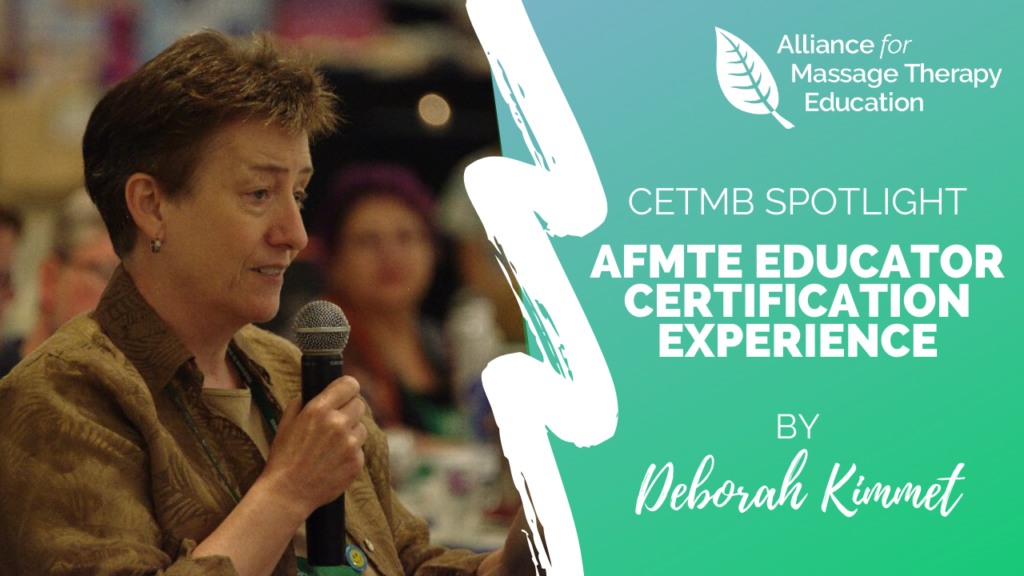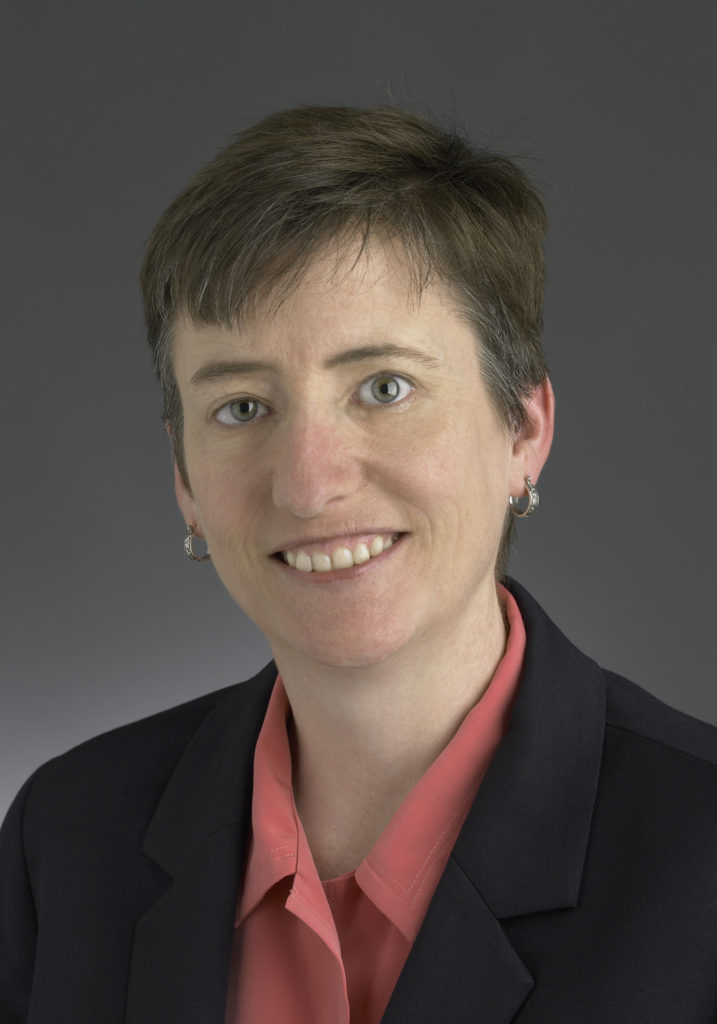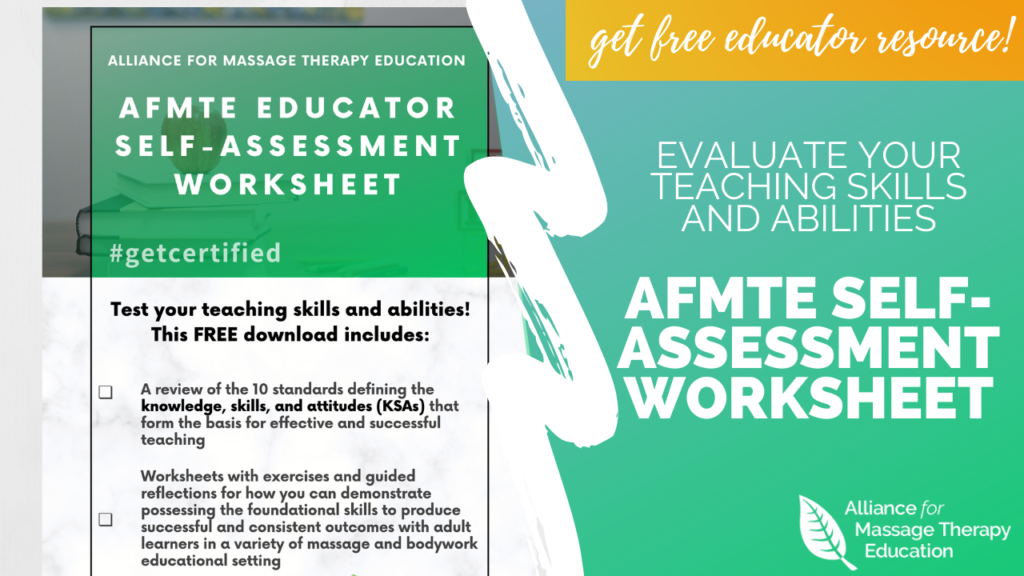
Are you concerned about underqualified and underprepared educators of therapeutic massage & bodywork and how they affect the entire industry? Deborah Kimmet shares reasons why she became an AFMTE Certified Educator of Therapeutic Massage & Bodywork (CETMB).
“Let’s start at the very beginning
A very good place to start…”
– Lyrics “Do-Re-Mi” from The Sound of Music
The Alliance for Massage Therapy Education (the Alliance) got its start a little over 10 years ago – I remember the first conference vividly. I’d gotten food poisoning on my drive to the first conference in Park City, Utah, so I was sicker than a dog throughout the weekend. And there was some contentiousness regarding the name of the organization: should we add bodywork to the name? Despite this rocky beginning, we’ve both survived and thrived. That early conflict within the organization told me a lot about the people involved: The issue was handled with sensitivity and with respect. And I’ve come to expect nothing less from those in the Alliance’s leadership.
It was also the first time that, despite my many years in the profession, that I’d heard the names of some of the movers and shakers in the field that don’t necessarily garner the headlines: Su Bibik, Pete Whitridge, and others. And I heard first-hand that some of the issues I faced as a solo continuing education provider also plagued others. It was a relief to learn that I wasn’t alone. I’d found my tribe.
The Alliance speaks to me because it’s the only massage therapy professional organization specifically geared toward education and educators. All educators, meaning continuing educators and school educators. As such, the AFMTE conferences allow me to touch base, swap ideas, and network with my tribe in an environment that’s designed specifically for us.
The conferences aren’t the only aspect of the organization that I support. Among the activities of the Alliance, the group wants to raise the standards for educators in our profession. My view is that we should all want to be better teachers to ensure that students are not only competent and capable but are excellent practitioners as well. Which, in the long term, only helps our profession grow and mature. To that end, the Teacher Education Standards Project (TESP) was launched.
The TESP was intended to develop a teacher certification process that applied to both school educators and continuing education providers. And the Alliance delivered! I took part in the beta-testing program and now the credential of Certified Educator of Therapeutic Massage & Bodywork is available to all. The portfolio process is fair and comprehensive. Just going through the process of becoming a CETMB has made me a better teacher. For example, I evaluate students throughout a seminar, but having to write down all those methods of evaluation made me really think about and quantify all of the things that I had been doing unconsciously. This in turn sparked other creative ways to bring evaluation into the seminar room.
I am excited to see the next steps the organization takes in service to our profession. One direction I’d like to see our profession go is to include massage therapy civics in entry-level education.
Civics: “a social science dealing with the rights and duties of citizens”
– Merriam-Webster.com
We already do some of that through ethics courses and through the study of local laws. Where we seem to fall short as a profession concerns the lack of discussion around the intersection of massage therapy, politics, and law making. Given the divisiveness of the general political climate, it’s understandable that no one wants to go there because of the potential for conflict.
But we are at a crossroads right now. School enrollments are declining. Barriers to practice through the enactment of laws intended to curb human trafficking are harming us in the form of exorbitant fees and demeaning regulations. And yet, it is the same few therapists doing all the work to fight these laws. Often I’m told: “I can’t, I have to work, I need the money.” We all do. What seems to be lacking is the understanding that not participating in the process can have a direct negative impact on all of our livelihoods.
What seems to be lacking is the understanding that not participating in the process can have a direct negative impact on all of our livelihoods.
Deborah Kimmet
It’s also critical to teach students that there are always political ramifications to any laws enacted. For example, lawmakers are pushing massage establishment licensing to fight human trafficking. And many massage therapists support these efforts without understanding the political implications of doing so. They do so out of a knee-jerk reaction that we have to get this criminal activity out of our profession, while not understanding that putting such language into law actually links our profession with illicit and illegal activities, rather than separating us from them.
Singling out our profession for regulation, which represents a small part of the entire human trafficking problem (roughly 4.5% to 6%), makes our profession responsible for addressing the problem, rather than acknowledging us as a healthcare profession that is also a victim of the problem. And as long as lawmakers and policy makers view us through the lens of human trafficking and prostitution, our ability to advance our profession will be limited. Yes, it’s important to do research studies about massage therapy. Yes, it’s important to raise educational standards. But we must also address these and other issues politically. And one way to do that is to lay the groundwork that therapists must step up and be good citizens. And I believe that entry-level educators have a responsibility to begin that process by teaching the basics of civic engagement. Others (CE providers and political activists) will fill in the gaps and tutor those who would be future activists.
I look forward to seeing where our profession goes in the future, and I know that the Alliance will play an integral role.

Deborah Kimmet, M.S., LMT, CMTBE, BCTMB, is the owner of PMT Seminars and the founder of LMT Body Politic.
Deb teaches Practical Movement, a movement education retraining technique, as a way to get clients moving as part of the healing process. Bringing over 35 years of group facilitation skills to the classroom, Deb teaches with a dose of humor and a focus on finding innovative methods to help students understand and retain the coursework.
LMT Body Politic is a brand new endeavor to call attention to the political side of the massage therapy profession.
To learn more about massage therapy politics, go to LMTbodypolitic.com
Are you ready to assess your own teaching skills and abilities? Check out this free resource for massage & bodywork educators!

